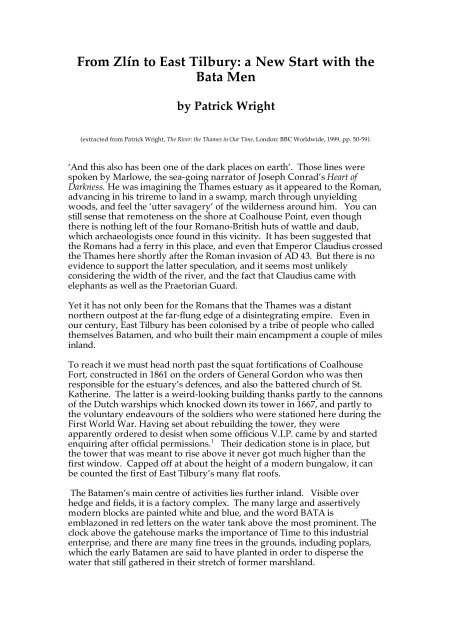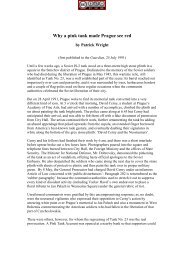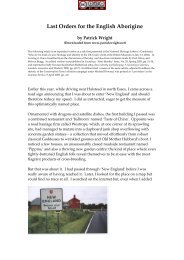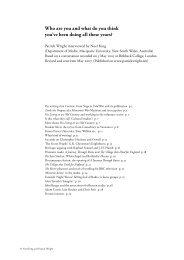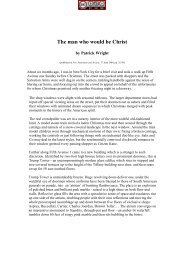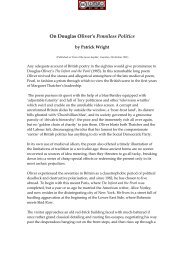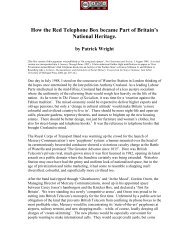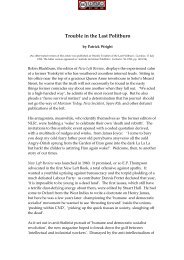From Zlín to East Tilbury: a New Start with the Bata ... - Patrick Wright
From Zlín to East Tilbury: a New Start with the Bata ... - Patrick Wright
From Zlín to East Tilbury: a New Start with the Bata ... - Patrick Wright
You also want an ePaper? Increase the reach of your titles
YUMPU automatically turns print PDFs into web optimized ePapers that Google loves.
<strong>From</strong> <strong>Zlín</strong> <strong>to</strong> <strong>East</strong> <strong>Tilbury</strong>: a <strong>New</strong> <strong>Start</strong> <strong>with</strong> <strong>the</strong><br />
<strong>Bata</strong> Men<br />
by <strong>Patrick</strong> <strong>Wright</strong><br />
(extracted from <strong>Patrick</strong> <strong>Wright</strong>, The River: <strong>the</strong> Thames in Our Time, London: BBC Worldwide, 1999, pp. 50-59).<br />
‘And this also has been one of <strong>the</strong> dark places on earth’. Those lines were<br />
spoken by Marlowe, <strong>the</strong> sea-going narra<strong>to</strong>r of Joseph Conrad’s Heart of<br />
Darkness. He was imagining <strong>the</strong> Thames estuary as it appeared <strong>to</strong> <strong>the</strong> Roman,<br />
advancing in his trireme <strong>to</strong> land in a swamp, march through unyielding<br />
woods, and feel <strong>the</strong> ‘utter savagery’ of <strong>the</strong> wilderness around him. You can<br />
still sense that remoteness on <strong>the</strong> shore at Coalhouse Point, even though<br />
<strong>the</strong>re is nothing left of <strong>the</strong> four Romano-British huts of wattle and daub,<br />
which archaeologists once found in this vicinity. It has been suggested that<br />
<strong>the</strong> Romans had a ferry in this place, and even that Emperor Claudius crossed<br />
<strong>the</strong> Thames here shortly after <strong>the</strong> Roman invasion of AD 43. But <strong>the</strong>re is no<br />
evidence <strong>to</strong> support <strong>the</strong> latter speculation, and it seems most unlikely<br />
considering <strong>the</strong> width of <strong>the</strong> river, and <strong>the</strong> fact that Claudius came <strong>with</strong><br />
elephants as well as <strong>the</strong> Prae<strong>to</strong>rian Guard.<br />
Yet it has not only been for <strong>the</strong> Romans that <strong>the</strong> Thames was a distant<br />
nor<strong>the</strong>rn outpost at <strong>the</strong> far-flung edge of a disintegrating empire. Even in<br />
our century, <strong>East</strong> <strong>Tilbury</strong> has been colonised by a tribe of people who called<br />
<strong>the</strong>mselves <strong>Bata</strong>men, and who built <strong>the</strong>ir main encampment a couple of miles<br />
inland.<br />
To reach it we must head north past <strong>the</strong> squat fortifications of Coalhouse<br />
Fort, constructed in 1861 on <strong>the</strong> orders of General Gordon who was <strong>the</strong>n<br />
responsible for <strong>the</strong> estuary’s defences, and also <strong>the</strong> battered church of St.<br />
Ka<strong>the</strong>rine. The latter is a weird-looking building thanks partly <strong>to</strong> <strong>the</strong> cannons<br />
of <strong>the</strong> Dutch warships which knocked down its <strong>to</strong>wer in 1667, and partly <strong>to</strong><br />
<strong>the</strong> voluntary endeavours of <strong>the</strong> soldiers who were stationed here during <strong>the</strong><br />
First World War. Having set about rebuilding <strong>the</strong> <strong>to</strong>wer, <strong>the</strong>y were<br />
apparently ordered <strong>to</strong> desist when some officious V.I.P. came by and started<br />
enquiring after official permissions. 1 Their dedication s<strong>to</strong>ne is in place, but<br />
<strong>the</strong> <strong>to</strong>wer that was meant <strong>to</strong> rise above it never got much higher than <strong>the</strong><br />
first window. Capped off at about <strong>the</strong> height of a modern bungalow, it can<br />
be counted <strong>the</strong> first of <strong>East</strong> <strong>Tilbury</strong>’s many flat roofs.<br />
The <strong>Bata</strong>men’s main centre of activities lies fur<strong>the</strong>r inland. Visible over<br />
hedge and fields, it is a fac<strong>to</strong>ry complex. The many large and assertively<br />
modern blocks are painted white and blue, and <strong>the</strong> word BATA is<br />
emblazoned in red letters on <strong>the</strong> water tank above <strong>the</strong> most prominent. The<br />
clock above <strong>the</strong> gatehouse marks <strong>the</strong> importance of Time <strong>to</strong> this industrial<br />
enterprise, and <strong>the</strong>re are many fine trees in <strong>the</strong> grounds, including poplars,<br />
which <strong>the</strong> early <strong>Bata</strong>men are said <strong>to</strong> have planted in order <strong>to</strong> disperse <strong>the</strong><br />
water that still ga<strong>the</strong>red in <strong>the</strong>ir stretch of former marshland.
<strong>Patrick</strong> <strong>Wright</strong> A <strong>New</strong> <strong>Start</strong> <strong>with</strong> <strong>the</strong> <strong>Bata</strong> Men<br />
If cheap mass produced shoes are your thing, as <strong>the</strong>y have been for countless<br />
people in Essex, <strong>the</strong>n <strong>East</strong> <strong>Tilbury</strong> is a place of greatness. Welling<strong>to</strong>n boots<br />
and school shoes once poured through <strong>the</strong> gates by <strong>the</strong> <strong>to</strong>n. In <strong>the</strong> fifties and<br />
sixties, British <strong>Bata</strong> broke new ground <strong>with</strong> high-stepping, fashion models like<br />
Streamline or High Jink, which could be purchased in white, honesty or bone.<br />
But you would search in vain now for a sensible ladies shoe called ‘Top Form’<br />
or for <strong>the</strong> popular <strong>Bata</strong> football boot that was once sold as ‘Cup Tie<br />
Continental’.<br />
Nowadays, <strong>the</strong> buildings are run down and mostly empty. Yet <strong>Bata</strong>’s<br />
production continues, albeit on a much reduced scale. It begins in a small<br />
design studio where a couple of men <strong>with</strong> <strong>the</strong> demeanour of preindustrial<br />
craftsmen carve <strong>the</strong> originals for a gloriously freakish gumboot - perfect for<br />
any child who ever suffered <strong>the</strong> urge <strong>to</strong> wear a frog’s face or a dinosaur on<br />
each foot. Nearby, a small conveyorised production line is in <strong>the</strong> process of<br />
‘slush-moulding’ a batch of pink children’s boots for a well-known retail<br />
chain. Sugarlike granules of plastic are turned in<strong>to</strong> a bright running liquid,<br />
which is <strong>the</strong>n poured mechanically in<strong>to</strong> appropriately sized moulds, heated,<br />
and <strong>the</strong>n pulled out by a man <strong>with</strong> an air pump. O<strong>the</strong>r <strong>Bata</strong>folk sit fur<strong>the</strong>r<br />
down <strong>the</strong> line: putting in <strong>the</strong> lining, attaching <strong>the</strong> all important Barbie<br />
stickers, or perhaps cutting a patch out of <strong>the</strong> new boots so that <strong>the</strong> allimportant<br />
bought-in replica of Mickey Mouse’s face can be mounted in <strong>the</strong><br />
<strong>to</strong>es. Here was <strong>the</strong> industrialised system of mass production often known as<br />
‘Fordism’, but it seemed <strong>to</strong> have dwindled back, almost <strong>to</strong> <strong>the</strong> level of a<br />
primitive folk art. I asked a Maltese worker called Vic Attard, what was<br />
distinctive about a <strong>Bata</strong>man. ‘Because it’s conveyor work,’ he answered, ‘and<br />
its repetitious and fast, so you become a <strong>Bata</strong>-ite. You think like a <strong>Bata</strong>man.<br />
Because production has got <strong>to</strong> move on...’<br />
Back in his office, <strong>the</strong> Managing Direc<strong>to</strong>r of British <strong>Bata</strong>, Peter Nicholls,<br />
explains that <strong>the</strong> <strong>East</strong> <strong>Tilbury</strong> operation is now only ‘a pimple on <strong>the</strong> bum’ of<br />
<strong>the</strong> global <strong>Bata</strong> operation. He employs 150 workers now, not <strong>the</strong> three or<br />
four thousand of old. Indeed, he was in <strong>the</strong> process negotiating <strong>the</strong> sale of<br />
<strong>the</strong> fac<strong>to</strong>ry and all its associated land <strong>to</strong> a developer. <strong>New</strong> gates were being<br />
installed <strong>to</strong> mark off <strong>the</strong> modest cluster of buildings that British BATA will<br />
continue <strong>to</strong> rent from <strong>the</strong> new owner, but despite <strong>the</strong> best efforts of<br />
everyone involved, no one can prevent <strong>the</strong> long-term future of British <strong>Bata</strong><br />
from curling up in<strong>to</strong> <strong>the</strong> shape of a question mark.<br />
You would have <strong>to</strong> be blind <strong>to</strong> drive through <strong>East</strong> <strong>Tilbury</strong> village <strong>with</strong>out<br />
recognising that something quite extraordinary has happened here. The<br />
2
<strong>Patrick</strong> <strong>Wright</strong> A <strong>New</strong> <strong>Start</strong> <strong>with</strong> <strong>the</strong> <strong>Bata</strong> Men<br />
houses of recent provenance could be anywhere, but Peter Nicholls, who<br />
offered <strong>to</strong> show me around, headed straight for <strong>the</strong> streets making up what is<br />
still known as <strong>the</strong> ‘Czech Village’. Built <strong>to</strong> accomodate <strong>the</strong> ‘<strong>Bata</strong>men’, <strong>the</strong>se<br />
are laid out on a grid system, and <strong>the</strong>ir houses are unmistakably middle-<br />
European and Modernist <strong>to</strong> boot. Each of <strong>the</strong>se identical flat-roofed industrial<br />
boxes sits in its own little garden, but <strong>the</strong> slightly bigger ones intended for<br />
managers have balconies and built-in garages <strong>to</strong>o.<br />
At <strong>the</strong> centre of this unconventional settlement stands a vast rectangular<br />
block called Stanford House. Now given over <strong>to</strong> flats and shops, this was<br />
once BATA Community House: a considerable works hotel, which also<br />
included accommodation for single people, several restaurants and a spacious<br />
ballroom, where <strong>Bata</strong>people used <strong>to</strong> dance in <strong>the</strong> formal manner of <strong>the</strong>ir<br />
times. The preserve of Mr. Thomas <strong>Bata</strong> himself, <strong>the</strong> penthouse on <strong>the</strong> <strong>to</strong>p<br />
floor is said once <strong>to</strong> have been fitted out in sumptuous Art Deco style.<br />
Sadly, new worlds are overwhelmed and die just as easily as old ones. A<br />
caved-in carpet shop just around <strong>the</strong> corner turns out once <strong>to</strong> have been a<br />
purveyor of <strong>the</strong> milk shakes and ‘Expresso’ - a ‘coffee bar’ which was<br />
prominently featured in <strong>the</strong> leaflets <strong>with</strong> which <strong>the</strong> company once sought <strong>to</strong><br />
attract young workers. There’s a war memorial, sports grounds, a medical<br />
centre, and a school, now run by <strong>the</strong> council. But Nicholls also points out<br />
many amenities that no longer exist.<br />
As <strong>the</strong> man in charge over recent years, he’s had <strong>to</strong> put an end <strong>to</strong> flower beds<br />
and children’s play areas. He’s had <strong>to</strong> fill in <strong>the</strong> swimming pool, close down<br />
<strong>the</strong> <strong>Bata</strong> College where <strong>the</strong> art of conveyorized shoe production was once<br />
taught, and demolish empty properties in order <strong>to</strong> clear sites for sale. He’s<br />
had <strong>to</strong> implement huge rent increases and <strong>the</strong>n dispose of those modernist<br />
company houses - selling <strong>the</strong>m <strong>to</strong> tenants at preferential rates, or unloading<br />
<strong>the</strong>m on private companies or housing associations. It’s a hard business, this<br />
thing that upriver types might lightly call ‘managing change’, but it had <strong>to</strong> be<br />
done - not<strong>with</strong>standing <strong>the</strong> fact that Thurrock council came along and, <strong>to</strong><br />
<strong>Bata</strong>’s amazement, declared <strong>the</strong> Czech village a conservation area and made<br />
<strong>the</strong> oldest of <strong>Bata</strong>’s redundant fac<strong>to</strong>ry blocks a listed building.<br />
One thing that has not been disposed of is <strong>the</strong> statue mounted on a grey<br />
s<strong>to</strong>ne plinth among formal hedges near <strong>the</strong> fac<strong>to</strong>ry’s main gate. The bronze<br />
hero who gazes out from this vantage point is Tomas <strong>Bata</strong> - <strong>the</strong> Czech ‘artist<br />
of action’ who initiated <strong>the</strong> <strong>East</strong> <strong>Tilbury</strong> settlement.<br />
*<br />
In <strong>the</strong> words of a company his<strong>to</strong>rian, it was Tomas <strong>Bata</strong> who did for <strong>the</strong> shoe<br />
what John D. Rockefeller did for oil, Henry Ford for <strong>the</strong> mo<strong>to</strong>r car, and<br />
Alexander Graham Bell for telecommunications. 2 Said <strong>to</strong> have been<br />
descended from nine generations of artisan shoemakers, <strong>Bata</strong> was born in <strong>the</strong><br />
Moravian <strong>to</strong>wn of <strong>Zlín</strong> in 1867. Dreaming of gentlemanly prosperity, he<br />
started <strong>with</strong> two sewing machines in a small rented house on <strong>the</strong> <strong>to</strong>wn<br />
square. An idealist who once claimed <strong>to</strong> have become a socialist after reading<br />
Tols<strong>to</strong>y and Zola, he came <strong>to</strong> see industrialisation as a means of achieving<br />
social reform as well as enormous personal wealth.<br />
3
<strong>Patrick</strong> <strong>Wright</strong> A <strong>New</strong> <strong>Start</strong> <strong>with</strong> <strong>the</strong> <strong>Bata</strong> Men<br />
<strong>Bata</strong> built up a massive fac<strong>to</strong>ry at <strong>Zlín</strong>, becoming one <strong>the</strong> greatest industrial<br />
capitalists in <strong>the</strong> Czech Republic. He imported American working methods,<br />
agitated his own workers in<strong>to</strong> forming a union, and drew up a ‘Moral<br />
Testament’ which placed <strong>the</strong> enterprise at <strong>the</strong> centre of <strong>the</strong> commonwealth<br />
and declared it responsible for uplifting <strong>the</strong> countryside around it. Business<br />
was projected as a service for <strong>the</strong> democratic age. Governed by <strong>the</strong> edict that<br />
‘<strong>the</strong> cus<strong>to</strong>mer is king’, <strong>Bata</strong>’s enterprise would give dignity <strong>to</strong> ordinary men<br />
and women, offering <strong>the</strong>m cheap but stylish shoes that would wear well and<br />
increase <strong>the</strong> wearer’s status and self- confidence.<br />
‘The <strong>Bata</strong> System’ is said <strong>to</strong> have resembled ‘<strong>the</strong> organisation of a modern<br />
democratic state’. Convinced that industry should be <strong>the</strong> spreader of ‘<strong>the</strong><br />
Good Life’, Tomas introduced profit-sharing systems and claimed proudly <strong>to</strong><br />
pay his workers better than any o<strong>the</strong>r company in <strong>the</strong> country. Convinced<br />
that ‘modern industry cannot be built by proletarians’, he developed his own<br />
college for young employees. The <strong>Bata</strong>man was never a boy, so Tomas <strong>Bata</strong><br />
insisted, but a man who earned his keep from <strong>the</strong> very start.<br />
Not content <strong>with</strong> creating a fac<strong>to</strong>ry that he hoped would produce 100,000<br />
pairs of shoes a day, Tomas <strong>Bata</strong> s<strong>to</strong>od for election as Mayor of <strong>Zlín</strong> and <strong>the</strong>n<br />
set about rebuilding his <strong>to</strong>wn from scratch. It was a bright vision of a new<br />
industrial order, pursued <strong>with</strong> impatient disregard for tradition and also for<br />
<strong>the</strong> Communist critics whom Tomas <strong>Bata</strong> reckoned were more interested in<br />
magnifying misery than in bringing about au<strong>the</strong>ntic renewal. It was one of<br />
his credos that ‘You cannot raise strong children in an apartment house’.<br />
Moreover, as <strong>the</strong> <strong>to</strong>wn architect F. K, L. Gahura is said <strong>to</strong> have <strong>to</strong>ld his<br />
colleague, Vladimir Karfík, ‘The Chief believes <strong>the</strong> man who has a flat in a<br />
building <strong>with</strong> a garden is more stable, and instead of following politics would<br />
ra<strong>the</strong>r potter about in <strong>the</strong> garden or sit out on <strong>the</strong> lawn, so he doesn’t go <strong>to</strong><br />
<strong>the</strong> pub or political meetings’. 3<br />
4
<strong>Patrick</strong> <strong>Wright</strong> A <strong>New</strong> <strong>Start</strong> <strong>with</strong> <strong>the</strong> <strong>Bata</strong> Men<br />
<strong>Zlín</strong> became a modernist garden city, unique <strong>to</strong> this day as <strong>the</strong> only<br />
Constructivist city in <strong>the</strong> world. The plan was full of straight lines, reflecting<br />
<strong>Bata</strong>’s belief that ‘Whoever shortens roads stretches life’. Determined that<br />
buildings should be cheap, quick <strong>to</strong> build and disposable after <strong>the</strong>ir time was<br />
done, he used <strong>the</strong> same industrial principles he had applied shoes -<br />
developing a ‘<strong>to</strong>tal concept’ and a set of architectural blueprints which could<br />
be employed over and over again. The British <strong>Bata</strong> fac<strong>to</strong>ry at <strong>East</strong> <strong>Tilbury</strong><br />
was reputedly full of philosophers in its heyday. But none of <strong>the</strong>m will have<br />
rivalled Tomas, who had his sayings inscribed in three foot letters on <strong>the</strong> wall<br />
surrounding <strong>the</strong> fac<strong>to</strong>ry in <strong>Zlín</strong>: ‘A wise man does at <strong>the</strong> beginning what a<br />
fool must do at <strong>the</strong> end’. Or again: ‘Buildings are but heaps of bricks and<br />
mortar, machines are but piles of steel; only men can give <strong>the</strong>m life’. That<br />
one was written at <strong>the</strong> <strong>to</strong>p of <strong>the</strong> central electrical plant which powered some<br />
20,000 machines throughout <strong>the</strong> fac<strong>to</strong>ry.<br />
At <strong>the</strong> <strong>Bata</strong> Celebration of May 1 1931, Tomas called urged <strong>the</strong> assembled<br />
<strong>Bata</strong>men <strong>to</strong> think globally: ‘Let us not be afraid of <strong>the</strong> future. Half of <strong>the</strong><br />
people in <strong>the</strong> world are walking barefoot and barely 5% of mankind is well<br />
shod’. He reiterated <strong>the</strong> point <strong>the</strong> following year: ‘Millions of people are still<br />
barefoot in this world! It is <strong>to</strong> be regretted that we do not yet know how <strong>to</strong><br />
create trade relations <strong>with</strong> <strong>the</strong>m!’<br />
It was <strong>with</strong> that mission in mind that <strong>the</strong> <strong>Bata</strong>men started <strong>to</strong> travel from <strong>Zlín</strong>.<br />
Tomas, who was an early exponent of flying, cruised around over Italy and<br />
North Africa, Palestine and India, eyeing up <strong>the</strong> bare-footed masses and<br />
selecting likely places for markets and fac<strong>to</strong>ries. He and his pioneering<br />
<strong>Bata</strong>men favoured open sites, where <strong>the</strong>y could set up <strong>the</strong>ir own <strong>to</strong>tal system<br />
from scratch: fac<strong>to</strong>ry, industrial village, distribution and retailing operation<br />
and all. The buildings and industrial methods may have been identical from<br />
one country <strong>to</strong> <strong>the</strong> next, but Tomas favoured au<strong>to</strong>nomy for <strong>the</strong> plants in<br />
different countries and regions. His empire was generated according <strong>to</strong> <strong>the</strong><br />
unconventional principle he called ‘world-wide decentralized business’.<br />
*<br />
‘Today this nation buried its hero’. That was <strong>the</strong> sentiment <strong>with</strong> which <strong>the</strong><br />
Czech Republic buried this airborne Icarus of <strong>the</strong> modern shoe, after he fell<br />
from <strong>the</strong> sky in a fatal aircrash in 1932. However, <strong>the</strong> migration of <strong>the</strong><br />
<strong>Bata</strong>men was not arrested by this unexpected disaster. Thomas, <strong>the</strong> son of<br />
Tomas, <strong>to</strong>ok over, and in 1933 <strong>the</strong> company bought an old steamship, which<br />
had been rusting for several years in Marseilles, filled it <strong>with</strong> shoes,<br />
manufacturing machinery, equipment for retail s<strong>to</strong>res, pigs, chickens and a<br />
vast boiler for vulcanizing shoes. They <strong>the</strong>n boarded 43 graduates from <strong>the</strong><br />
<strong>Bata</strong> School for Young Men at <strong>Zlín</strong>, and sailed for India and <strong>the</strong>n Java. O<strong>the</strong>r<br />
<strong>Bata</strong>men were transported <strong>to</strong> <strong>the</strong> West Indies, where <strong>the</strong>y were soon fighting<br />
off an invasion of cheap Japanese plimsoles. Wherever <strong>the</strong> young <strong>Bata</strong>men<br />
went, <strong>the</strong>y <strong>to</strong>ok capital from <strong>the</strong> home company in <strong>Zlín</strong>, along <strong>with</strong><br />
machines, building plans and technical skills. It is said that <strong>the</strong>y sang old<br />
Moravian folk songs as <strong>the</strong>y and <strong>the</strong>ir local labourers worked. They founded<br />
‘<strong>Bata</strong>nagar’ in India, ‘<strong>Bata</strong>wa’ in Canada, ‘<strong>Bata</strong>pur’ in Pakistan, ‘Kalibat’a’ in<br />
Indonesia - building up ‘a sort of civilisation somehow different from <strong>the</strong><br />
commercial and industrial civilisation of <strong>the</strong> time’.<br />
5
<strong>Patrick</strong> <strong>Wright</strong> A <strong>New</strong> <strong>Start</strong> <strong>with</strong> <strong>the</strong> <strong>Bata</strong> Men<br />
*<br />
It was partly <strong>with</strong> an eye on Britain’s imperial markets that <strong>Bata</strong> first came <strong>to</strong><br />
<strong>East</strong> <strong>Tilbury</strong> in 1932, acquiring a considerable stretch of marshland <strong>with</strong> a few<br />
houses that were soon disposed of and, as one elder remembers, ‘nothing but<br />
a few pea-fields’ for anybody <strong>to</strong> work in. Tomas <strong>Bata</strong> is said <strong>to</strong> have<br />
approved <strong>the</strong> site and come <strong>to</strong> terms <strong>with</strong> <strong>the</strong> farmer who owned it, but <strong>East</strong><br />
<strong>Tilbury</strong>’s fac<strong>to</strong>ry and ‘Czech village’ were built after <strong>the</strong> founder’s death. The<br />
<strong>Bata</strong>men arrived, recruited some young natives from Grays and o<strong>the</strong>r nearby<br />
<strong>to</strong>wns, and set <strong>to</strong> work communicating by sign language as <strong>the</strong>y constructed<br />
a new world. Here, as at <strong>Zlín</strong>, <strong>the</strong> garden village was built under <strong>the</strong> slogan<br />
‘living separately - working <strong>to</strong>ge<strong>the</strong>r’. Everything was designed, right down<br />
<strong>to</strong> <strong>the</strong> cherry trees planted in every <strong>Bata</strong>man’s front garden; and life in this<br />
dramatically renovated pocket of Essex was soon being conducted in <strong>the</strong><br />
proven <strong>Bata</strong> way.<br />
There were <strong>to</strong>wn meetings, sports facilities, and company shops that sold<br />
produce from <strong>the</strong> <strong>Bata</strong> farm. There was a <strong>Bata</strong> fire brigade and even a <strong>Bata</strong><br />
milkround. The <strong>Bata</strong> Record reported on <strong>Bata</strong> sports events, celebrated <strong>the</strong><br />
marriages of <strong>Bata</strong>men and <strong>Bata</strong> girls, and printed such things as <strong>the</strong> BATA<br />
ABC - ‘A is for ambition by which we are fired. B is for <strong>Bata</strong> by which it is<br />
inspired’. It is said that just about everyone in Thurrock has worked at <strong>Bata</strong> at<br />
one time or ano<strong>the</strong>r: some hated <strong>the</strong> mixture of industrial routine and social<br />
paternalism and left as soon as <strong>the</strong>y could, but <strong>the</strong> o<strong>the</strong>rs stayed for a lifetime,<br />
settling for a secure job, a place in <strong>the</strong> envied <strong>Bata</strong> village, and a wage that<br />
didn’t seem at all bad by local standards.<br />
<strong>Bata</strong>’s industrial community became a bastion of Czech liberty in <strong>the</strong><br />
approach <strong>to</strong> <strong>the</strong> Second World War. In September 1938, <strong>the</strong> British Prime<br />
Minister, Neville Chamberlain, responded <strong>to</strong> <strong>the</strong> news that Hitler had<br />
annexed <strong>the</strong> Sudetenland in Czechoslovakia by saying that it was ‘horrible,<br />
fantastic, incredible’ that Britain should be preparing for war because of a<br />
quarrel in ‘a far away country’ between people ‘of whom we know nothing’.<br />
Had he followed Elizabeth I’s example and visited <strong>Tilbury</strong>, he would never<br />
have been so foolish. By that time, Thomas <strong>Bata</strong>, who had yet <strong>to</strong> relocate in<br />
Canada, was already running raids in<strong>to</strong> <strong>the</strong> newsreel <strong>the</strong>atres in London,<br />
accompanied by <strong>Bata</strong>men who would ensure loud boos for Germany and<br />
even louder cheers for <strong>the</strong> Czechs. When <strong>the</strong> French government seemed <strong>to</strong><br />
take a strong line against Hitler shortly before Chamberlain’s broadcast, <strong>the</strong><br />
<strong>Bata</strong>men made banners announcing ‘We welcome our French Allies’, and<br />
went <strong>to</strong> greet <strong>the</strong>ir representatives at Croydon Airport. As <strong>the</strong> war<br />
continued and <strong>the</strong> whole of <strong>the</strong> Czech Republic fell <strong>to</strong> <strong>the</strong> Nazis, The BATA<br />
Record, signed up <strong>to</strong> <strong>the</strong> words of Jan Masaryk, <strong>the</strong>n <strong>the</strong> Czech Secretary of<br />
Foreign Affairs, who had <strong>to</strong>ld <strong>the</strong> assembled <strong>Bata</strong>men in <strong>Bata</strong>wa, Canada,<br />
that ‘Everyone outside of Nazi slavery must consider it his holy duty <strong>to</strong> fight<br />
for vic<strong>to</strong>ry’.<br />
British <strong>Bata</strong>’s business thrived through <strong>the</strong> Second World War, thanks partly<br />
<strong>to</strong> conveyorized production of <strong>the</strong> British army boot. <strong>East</strong> <strong>Tilbury</strong> formed its<br />
own ‘<strong>Bata</strong> Army’, a detachment of <strong>the</strong> home guard in which <strong>the</strong> managing<br />
direc<strong>to</strong>r of that time, John Tusa, served as a private. There were galas and<br />
concerts for members <strong>the</strong> Czech forces in Britain, and <strong>the</strong> ballroom at <strong>Bata</strong><br />
House resounded <strong>with</strong> <strong>the</strong> ‘songs of <strong>the</strong> homeland’. Hospitality was also<br />
6
<strong>Patrick</strong> <strong>Wright</strong> A <strong>New</strong> <strong>Start</strong> <strong>with</strong> <strong>the</strong> <strong>Bata</strong> Men<br />
extended <strong>to</strong> foreign <strong>Bata</strong>men: in February 1943, a Canadian <strong>Bata</strong>man now<br />
serving in Britain came <strong>to</strong> <strong>East</strong> <strong>Tilbury</strong> and reported that he felt entirely at<br />
home for <strong>the</strong> first time since crossing <strong>the</strong> Atlantic: ‘ he was surrounded by <strong>the</strong><br />
things that he knew, <strong>the</strong> same type of time clocks, <strong>the</strong> same sounds, <strong>the</strong> same<br />
machines, <strong>the</strong> smell of lea<strong>the</strong>r and <strong>the</strong> same five s<strong>to</strong>rey buildings...’<br />
That same pattern of national loyalty would be resumed in 1968, when<br />
Czechs fleeing <strong>the</strong> Russian tanks, were welcomed at <strong>East</strong> <strong>Tilbury</strong> and given<br />
work and assistance. By <strong>the</strong>n, British <strong>Bata</strong> had a workforce of some 3,500<br />
recruiting from all over <strong>the</strong> world - elsewhere in Britain, Ireland, Europe,<br />
India, Pakistan and South Africa. Vic Attard puts his arrival down <strong>to</strong> a<br />
company recruiter called Mr. Ives, who came <strong>to</strong> Malta looking for workers in<br />
1966 - a few friends signed up, and decided <strong>to</strong> follow as soon as word got<br />
back about <strong>the</strong> Beatles, miniskirts and o<strong>the</strong>r attractions of ‘swinging’ London:<br />
‘Here I come I said... You can’t s<strong>to</strong>p me’. And so Vic <strong>to</strong>o became a <strong>Bata</strong>man,<br />
and settled in<strong>to</strong> <strong>the</strong> ‘big happy family’ at <strong>East</strong> <strong>Tilbury</strong>. Before long, he was in<br />
<strong>the</strong> habit of surreptitiously picking dark red <strong>Bata</strong> roses from <strong>the</strong> flower beds<br />
outside <strong>Bata</strong> House as he walked home at <strong>the</strong> end of his shift, and presenting<br />
<strong>the</strong>m <strong>to</strong> his wife - not a <strong>Bata</strong>girl, as it happens, but a Maltese woman he<br />
happened <strong>to</strong> meet in Grays.<br />
Just across <strong>the</strong> road from <strong>the</strong> old Community House, <strong>the</strong> <strong>Bata</strong> Cinema used<br />
<strong>to</strong> run three different programmes every week. In May 1962, it was<br />
screening ‘The World of Suzie Wong’, <strong>with</strong> an ‘emotional’ American drama<br />
called ‘Back Street’ due <strong>to</strong> <strong>to</strong>p <strong>the</strong> bill on Sunday and a ‘much more<br />
interesting’ picture called ‘I Passed for White’, coming on Wednesday.<br />
*<br />
But <strong>Bata</strong>’s age has passed; and <strong>the</strong> cinema, which has been res<strong>to</strong>red <strong>with</strong> a<br />
grant from English Heritage, is now <strong>East</strong> <strong>Tilbury</strong> Village Hall, where <strong>the</strong> <strong>Bata</strong><br />
elders meet for tea, Bingo and sometimes line-dancing <strong>to</strong>o. The day I called<br />
in, <strong>the</strong>y didn’t need much prompting <strong>to</strong> start looking back fondly on life as it<br />
was before, as one lady put it, ‘<strong>the</strong> whole world changed’. They remembered<br />
<strong>the</strong> Christmas voucher, adding that, of course, it did have <strong>to</strong> be spent in <strong>the</strong><br />
company’s own outlets in Community House. There would be £5 in a money<br />
box for every new born <strong>Bata</strong>child, and no-one had objected <strong>to</strong> <strong>the</strong> fact that a<br />
penny for Dr. Barnadoes was deducted at source from <strong>the</strong> wage. They<br />
remember how children who lived elsewhere in Thurrock envied <strong>the</strong>m for<br />
<strong>the</strong>ir swimming pool and <strong>the</strong>ir gala days. The safety of <strong>the</strong> old Czech village<br />
had been so taken for granted that people going away on <strong>the</strong>ir annual<br />
holidays would leave <strong>the</strong>ir back doors unlocked. The ‘Top Czechs’ may have<br />
ruled <strong>with</strong> an ‘Iron fist’, but though <strong>the</strong> discipline had been strict, <strong>the</strong>re is no<br />
doubt as one woman volunteers, that ‘<strong>the</strong> youngsters <strong>to</strong>day could do <strong>with</strong> it’.<br />
The <strong>Bata</strong> system involved a profit-sharing scheme which, according <strong>to</strong> a<br />
company handbook from <strong>the</strong> fifties, was ‘based on <strong>the</strong> assumption that in<br />
course of time <strong>the</strong> enterprise will be owned and largely controlled by <strong>the</strong><br />
people who work in it’. But somehow, that never happened. Nobody likes<br />
<strong>to</strong> moan, but one man, who had put in 40 years of service, counted up his<br />
entire annual pension and arrived at a sum that would hardly buy a meal for<br />
two at a fashionable London restaurant.<br />
7
<strong>Patrick</strong> <strong>Wright</strong> A <strong>New</strong> <strong>Start</strong> <strong>with</strong> <strong>the</strong> <strong>Bata</strong> Men<br />
These <strong>Bata</strong>folk may be adrift in <strong>the</strong> ruins of a community that once promised<br />
<strong>to</strong> see <strong>the</strong>m through <strong>to</strong> <strong>the</strong> end, but <strong>the</strong>y are not inclined <strong>to</strong> engage in public<br />
lamentation. They are making a go of living <strong>with</strong>out Big Bro<strong>the</strong>r and tend <strong>to</strong><br />
keep a concerned eye on one ano<strong>the</strong>r. Yet, even <strong>the</strong> most optimistic of <strong>the</strong>se<br />
retired <strong>Bata</strong>folk can’t help feeling a little sad as <strong>the</strong>y look back. Mr. and Mrs.<br />
Purkiss sit in <strong>the</strong> porch of <strong>the</strong> <strong>Bata</strong> house that <strong>the</strong>y bought for £15,000 when<br />
<strong>the</strong> company unloaded it. He became a <strong>Bata</strong>man in 1936, and was among<br />
those who went <strong>to</strong> <strong>Zlín</strong> <strong>to</strong> be trained in industrial methods and also <strong>the</strong><br />
Czech language. On his return, he helped <strong>to</strong> introduce conveyorized<br />
production at <strong>Tilbury</strong>, and <strong>the</strong>n went on <strong>to</strong> do <strong>the</strong> same in Australia and<br />
elsewhere. ‘I saw <strong>the</strong> world’, he says from his chair, adding that he’s glad he<br />
bought his house in <strong>East</strong> <strong>Tilbury</strong>, since some of <strong>the</strong> former <strong>Bata</strong>folk who<br />
couldn’t or wouldn’t are now paying large rents <strong>to</strong> private landlords.<br />
Reg Fields sticks <strong>to</strong> his patch <strong>to</strong>o - indeed, his life is so localised that he has <strong>to</strong><br />
struggle <strong>to</strong> remember his area code. Yet he <strong>to</strong>o was sent out <strong>to</strong> <strong>Zlín</strong>, as a lad<br />
in 1933 - ‘a fantastic place’, as he says, still shaking his head in amazement at<br />
<strong>the</strong> fact that he, a lad from Thurrock, should ever have learned how <strong>to</strong> ski.<br />
As for <strong>East</strong> <strong>Tilbury</strong>, he looks regretfully at <strong>the</strong> ordinary housing estate that<br />
has since been built on <strong>the</strong> fields he used <strong>to</strong> see from his window in <strong>the</strong> Czech<br />
village: ‘we were a little world of our own... You might call it sweated labour,<br />
but it was a team thing...’ There was no trade union in <strong>the</strong> early days, but as<br />
a member of <strong>the</strong> works advisory council, he had managed <strong>to</strong> get <strong>the</strong><br />
company <strong>to</strong> install drinking fountains in <strong>the</strong> hot fac<strong>to</strong>ry areas. And yet being<br />
a <strong>Bata</strong>man had ‘nothing <strong>to</strong> do <strong>with</strong> creeping or blue-eyes... not in our little<br />
crowd. We had grown as a team’. So what happened <strong>to</strong> pull all this apart? ‘I<br />
don’t know, none of us really know. I got made redundant’....<br />
The man who does know is Peter Nicholls, <strong>the</strong> managing direc<strong>to</strong>r who lives<br />
in <strong>the</strong> real world in which idealistic businesses fall as well as rise. To begin<br />
<strong>with</strong>, he suggests, <strong>the</strong> amount of national au<strong>to</strong>nomy fostered in <strong>Bata</strong>’s world<br />
system, probably s<strong>to</strong>od in <strong>the</strong> way of developing truly global brands of <strong>the</strong><br />
kind that have become so important for o<strong>the</strong>r manufacturers. <strong>Bata</strong> was once<br />
proud <strong>to</strong> describe itself as <strong>the</strong> ‘largest exporters of footwear in Gt. Britain’, but<br />
<strong>the</strong> colonial markets which were once so profitable, dried up thanks partly <strong>to</strong><br />
<strong>the</strong> policy of global decentralization under which new <strong>Bata</strong> plants were<br />
opened in Africa and <strong>the</strong> Caribbean. Perhaps <strong>the</strong> <strong>Bata</strong> name also fell <strong>to</strong>o far<br />
down market as it reached out <strong>to</strong>wards <strong>the</strong> masses. As for <strong>the</strong> <strong>Bata</strong> shops<br />
that once traded across Britain as family s<strong>to</strong>res, <strong>the</strong>y were sold off <strong>to</strong> Sears,<br />
and not very advantageously.<br />
Asked what <strong>the</strong> future holds for <strong>East</strong> <strong>Tilbury</strong>, now that it is no longer<br />
sustained by <strong>Bata</strong>, Mr Nicholls hopes that it doesn’t revert <strong>to</strong> type as ‘<strong>the</strong><br />
dumping ground of England’ - a no-go zone in which ‘<strong>the</strong>y sometimes dig a<br />
hole and call it Lakeside’. This may sounds excessively gloomy, but<br />
Thurrock has long been so seriously devoted <strong>to</strong> waste disposal that it is hard<br />
<strong>to</strong> go for a walk <strong>with</strong>out falling in<strong>to</strong> a rubbish tip or landfill site. As for its<br />
main <strong>to</strong>wn, having been so thoroughly demolished by its council in <strong>the</strong> sixties<br />
and seventies, Grays is freely described as ‘a dump’ by its own disappointed<br />
inhabitants. One of <strong>the</strong> few guidebooks written about this sou<strong>the</strong>rn stretch of<br />
Essex even suggests that Thurrock may not have been named after ‘Thor’s<br />
Oak’ after all. The alternative root is ‘thorrocke’ - said <strong>to</strong> mean <strong>the</strong> place in<br />
<strong>the</strong> bot<strong>to</strong>m of a ship ‘wherein ys ga<strong>the</strong>red all <strong>the</strong> fyl<strong>the</strong>’. 4<br />
8
<strong>Patrick</strong> <strong>Wright</strong> A <strong>New</strong> <strong>Start</strong> <strong>with</strong> <strong>the</strong> <strong>Bata</strong> Men<br />
As for <strong>the</strong> old radar station down at Coalhouse Point, Nicholls imagines that a<br />
new road bridge might one day land in that place where <strong>the</strong> Romans are said<br />
<strong>to</strong> have made <strong>the</strong>ir crossing. I must have raised an eyebrow at this, because<br />
he insisted that <strong>East</strong> <strong>Tilbury</strong> would be an excellent site for crossing <strong>the</strong><br />
Thames - perfect for those who wanted <strong>to</strong> skirt London and get through<br />
Thurrock in a hurry <strong>with</strong> <strong>the</strong> help of a new outer peripheral route connected<br />
<strong>to</strong> <strong>the</strong> M25.<br />
9


